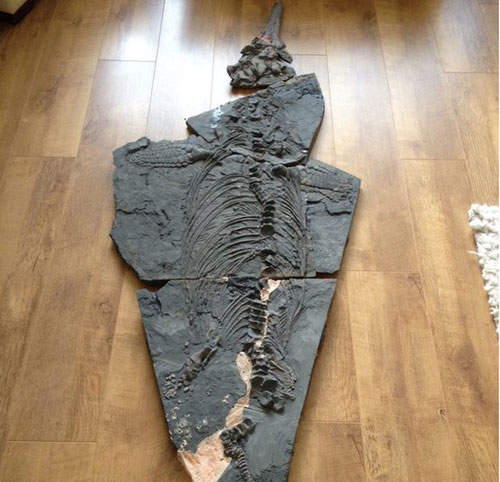An amateur fossil hunter has unearthed a 7ft skeleton of a carnivorous marine reptile on a beach in south Wales.
Jonathan Bow, 34, discovered the ichthyosaur while walking the shoreline in the Penarth area.
A palaeontologist at the National Museum Wales said the discovery is important as it appears to be complete.
“Something this large and complete is a once in a lifetime find,” said Mr Bow, a computer programmer in Swansea.
Other fossils from the Jurassic period have been unearthed in the area, dating back 200 million years.
He said anyone walking the dog on the beach could have found it, adding that an inch-long piece of rock took his eye after being exposed on a changing tide in September.
It took Mr Bow and his brother a day to expose the fossil in about 60kg (132lb) of stone.
Jump media player
Media player help
Out of media player. Press enter to return or tab to continue.
Jonathan Bow described the fossil as a ‘whopper’
But he explained that the “labour intensive” work only began after it was taken away from the beach in three sections.
The stone around it had to be removed so it could be fully appreciated and then he alerted the museum service about his find.
Ichthyosaurs (fish lizards) were predatory reptiles that swam the world’s oceans while dinosaurs walked the land.
They died out around 25 million years before the extinction event that wiped out the dinosaurs and were replaced by plesiosaurs, a long neck marine reptile.
Mr Bow has also discovered part of a jaw of a plesiosaur since he started his hobby several years ago.
Palaeontologist Cindy Howells, collections manager in the Department of Geology at National Museum Wales, described the ichthyosaur as a “potentially very, very important find” given it was complete.
She has only seen it in photographs and hopes to view it for herself soon along with the other finds made by Mr Bow.
Ms Howells said other ichthyosaur skulls and paddles have been found in Wales previously but never a fully articulated specimen, although other complete remains have been discovered in Dorset and elsewhere.



